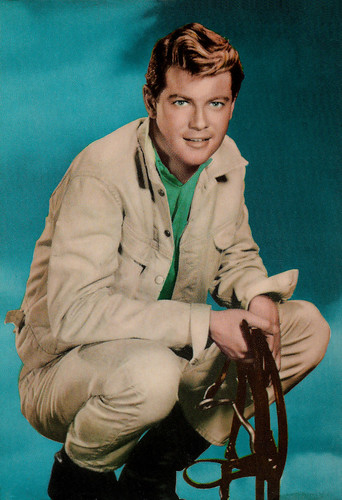
Spanish postcard by C y A, no. 29. Photo: Warner Bros. Caption: Troy Donahue, co-stars in Warner Bros. Palm Springs Weekend.
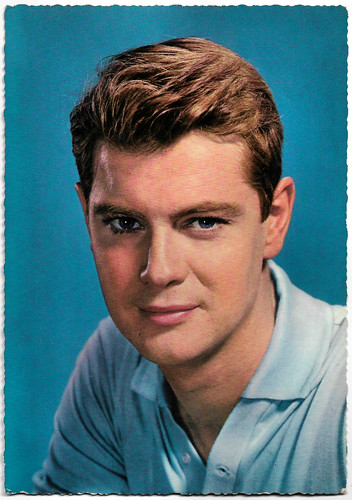
West-German postcard by Krüger, no. 902/23. Photo: Terb Agency.

West-German postcard by Krüger, nr. 902/15. Photo: Terb Agency.
Young, blond, blue-eyed
Troy Donahue was born Merle Johnson Jr. in New York, in 1936. He was the son of Merle Johnson Sr., the manager of the motion-picture department of General Motors, and a retired stage actress. His father died when Troy was 14.
When Donahue was 18, he moved to New York and got a job as a messenger in a film company founded by his father. Troy first came into contact with the acting profession while studying journalism at Columbia. At that time, he joined a repertory company. In the mid-1950s, he left for Hollywood to pursue his acting career.
Actress Fran Bennett introduced him to agent Henry Willson, who represented Rock Hudson, among others. Willson signed him and changed his name to Troy Donahue. He made his film debut in 1957 with a small, uncredited role in the Film Noir Man Afraid (Harry Keller, 1957) starring George Nader.
Larger roles followed, including in the drama The Tarnished Angels (Douglas Sirk, 1957) starring Rock Hudson and Robert Stack, and the Film Noir Live Fast, Die Young (Paul Henreid, 1958). Donahue achieved good reviews for a brief, but effective part in Imitation of Life (Douglas Sirk, 1959), playing a man who beats up his girlfriend after he discovers she is black.
The big break came in 1959 when Warner Bros. signed him to a long-term contract. The studio put him to work guest-starring in episodes of their Western TV series, such as Colt .45 (1959), Maverick (1959), Sugarfoot (1959), The Alaskans (1960), and Lawman (1960). They also gave him a leading role opposite Sandra Dee in A Summer Place (Delmer Daves, 1959). The film was a huge success. The young, blond, blue-eyed Donahue became a star, especially with teenage girls, and regularly appeared on the cover of magazines.
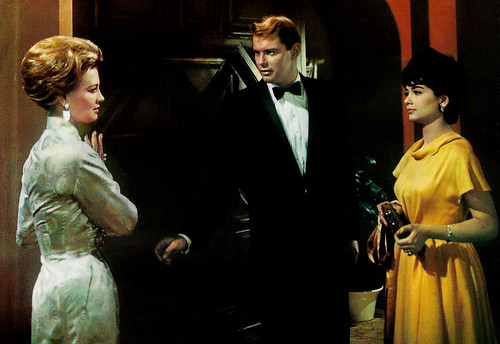
Spanish postcard by CyA, no. 35. Photo: Warner Bros. Angie Dickinson, Troy Donahue, and Suzanne Pleshette in Rome Adventure (Delmer Daves, 1962).
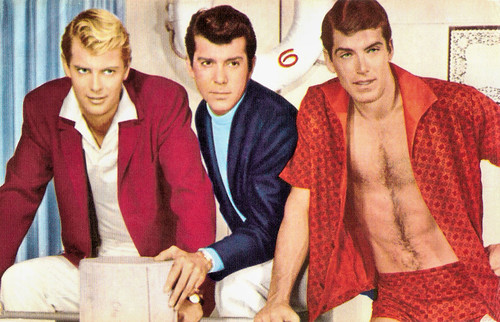
Spanish postcard by Oscarcolor, no. 16-T. Photo: Warner Bros. Troy Donahue, Lee Patterson, and Van Williams in the TV series Surfside 6 (1960-1962).
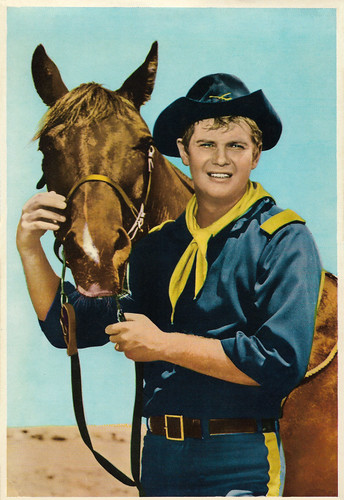
Spanish postcard by Archivo Bermejo, no. C- 245. Photo: Warner Bros. Troy Donahue in A Distant Trumpet (Raoul Walsh, 1964).
Out of fashion
In the following years, Troy Donahue played leading roles for Warner Bros. in several major films, especially those aimed at teenage audiences. Donahue's most successful film was Parrish (Delmer Daves, 1961), in which he played the title character. Donahue and Daves reunited for another melodrama, Susan Slade (Delmer Daves, 1962).
In Rome Adventure (Delmer Daves, 1962), he starred opposite Suzanne Pleshette, whom he married and divorced again in 1964. In addition to his film work, Troy Donahue could also be seen on television, first in Surfside 6 (1960-1962), one of several spin-offs of 77 Sunset Strip, and then in Hawaiian Eye (1962-1963), another spinoff of Sunset Strip.
A more challenging role came with the Western A Distant Trumpet (Raoul Walsh, 1964), about the conflicts between the US Cavalry and the Indians. In 1965, Donahue was cast as a psychopathic killer opposite Joey Heatherton in the thriller My Blood Runs Cold (William Conrad, 1965). While Donahue was happy to break type and play a different type of role, it was not well received by the public.
After years in the limelight, Troy Donahue went out of fashion and was offered smaller and lesser roles. In 1966, his contract with Warner Bros. was not renewed. Low-budget television films became his main income. He had roles in low-budget films such as Sweet Savior (Robert L. Roberts, 1971), Cockfighter (Monte Hellman, 1974), and the Horror film Seizure (1974), Oliver Stone's directorial debut. A small revival came when Francis Ford Coppola gave him a role in The Godfather Part II (1974) as the fiancé of Connie Corleone. The character in that film carried his own name, Merle Johnson. However, due to an alcohol and drug addiction, he disappeared from view in the mid-1970s. For a while, he was even homeless. In 1982, he joined Alcoholics Anonymous, which he credited for helping him achieve and maintain sobriety.
In the mid-1980s he returned to film, mostly exploitation films for the low-budget home video market, e.g., Sexpot (Chuck Vincent, 1990) and Nudity Required (John T. Bone, 1990). But he also appeared in the cult classic Cry-Baby (John Waters, 1990) starring Johnny Depp. The film spawned a Broadway musical of the same name which was nominated for four Tony Awards. Donahue's final film role was in the comedy The Boys Behind the Desk (2000), directed by Sally Kirkland. Troy Donahue was married several times, but never for long. His brief marriage to actress Suzanne Pleshette lasted from 4 January to 8 September 1964. In 1966, he married actress Valerie Allen. The couple was married for just over a year and divorced in 1968. He was also married to Vicky Taylor from 1979 to 1981. At the time of his death, he was living with his fiancée, mezzo-soprano Zheng Cao. Donahue had two children, a son and a daughter, and three grandchildren. Troy Donahue died of a heart attack in 2001 at the age of 65.
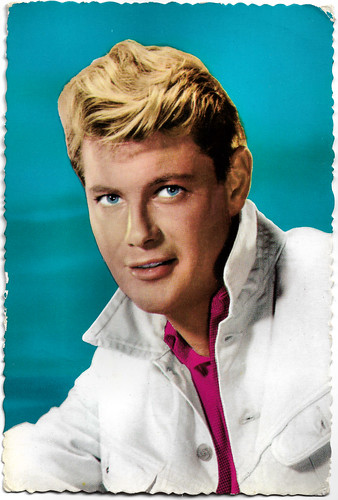
Spanish postcard by Archivo Bermejo, no. C 43. Photo: Warner Bros. Caption: "Troy Donahue (John Hunter) de Warner Bros." John Hunter was the character Donahue played in A Summer Place (Delmer Daves, 1959), but the picture seems to be a studio portrait and not connected to this film.
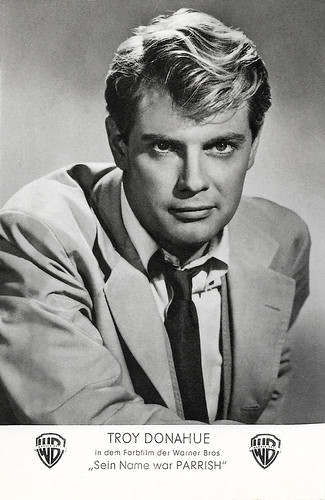
West-German postcard. Photo: Warner Bros. Troy Donahue in Parrish (Delmer Daves, 1961).

Israelian postcard by Editions de Luxe, no. 133.
Source: Ed Stephan (IMDb), Wikipedia (Dutch and English), and IMDb.
This post was last updated on 16 January 2024.
No comments:
Post a Comment